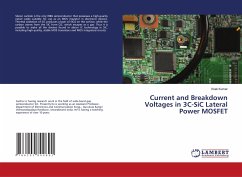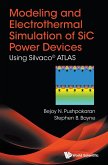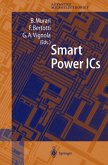SiC has been an excellent material for power
switching devices because of its wide bandgap and
high breakdown field. SiC power MOSFETs below 10 kV
have been successfully developed and fabricated in
the past decade. However, MOSFETs blocking above 10
kV face the problem of high on-state resistance.
This problem cannot be solved within MOSFET itself.
P-channel IGBTs, a new type of SiC power transistors
that provide a solution for 20 kV applications, are
studied in this book. Extensive numerical simulation
is carried out to demonstrate the device performance
and to optimize the device design. The first high
performance 20 kV P-IGBT is successfully fabricated.
These P-IGBTs exhibit significant conductivity
modulation in the drift layer, which greatly reduces
the on-state voltage drop. Assuming a 300 Watt per
square centimeter power package limit, the maximum
currents of the experimental P-IGBTs are 1.24x and 2x
higher than the theoretical maximum current of a 20
kV MOSFET at room temperature and 177°C, respectively.
switching devices because of its wide bandgap and
high breakdown field. SiC power MOSFETs below 10 kV
have been successfully developed and fabricated in
the past decade. However, MOSFETs blocking above 10
kV face the problem of high on-state resistance.
This problem cannot be solved within MOSFET itself.
P-channel IGBTs, a new type of SiC power transistors
that provide a solution for 20 kV applications, are
studied in this book. Extensive numerical simulation
is carried out to demonstrate the device performance
and to optimize the device design. The first high
performance 20 kV P-IGBT is successfully fabricated.
These P-IGBTs exhibit significant conductivity
modulation in the drift layer, which greatly reduces
the on-state voltage drop. Assuming a 300 Watt per
square centimeter power package limit, the maximum
currents of the experimental P-IGBTs are 1.24x and 2x
higher than the theoretical maximum current of a 20
kV MOSFET at room temperature and 177°C, respectively.








